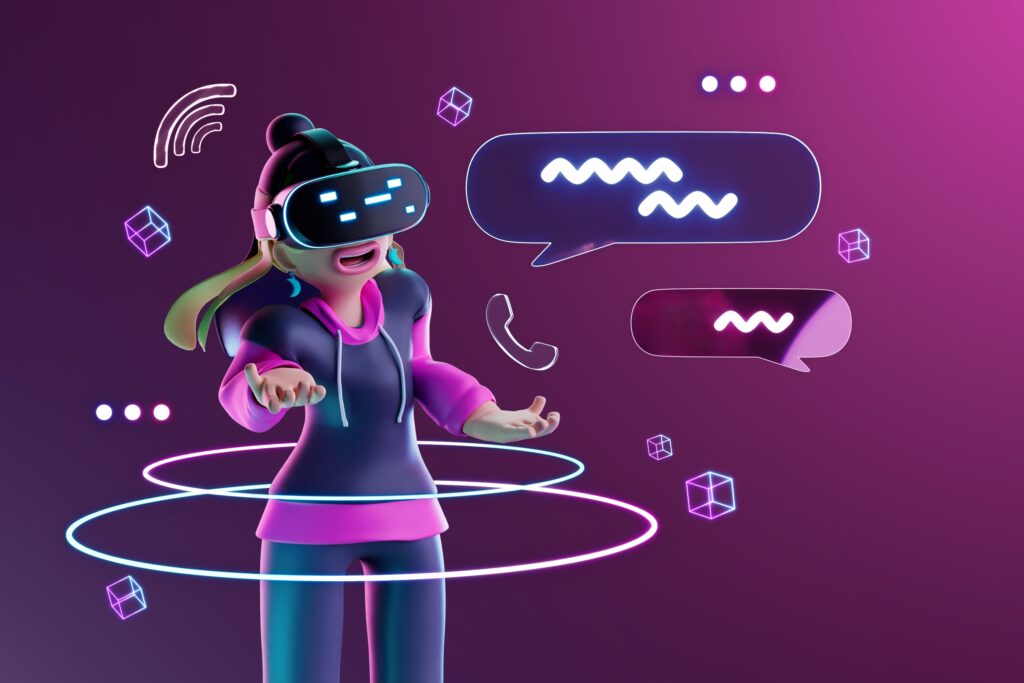
(Source – Shutterstock)
Do chatbots have a role to play in the metaverse?
- Chatbots allow businesses to provide faster, more individualized customers support while minimizing employee workload and enhancing talent retention
- Users will communicate with digital avatars, which are 3D representations of chatbots
Noticed how there’s a rise in chatbot usage? They are being used by businesses to automate customers experience processes. Organizations are seeing major benefits of adopting a chatbot, such as cost savings and efficiency, with reduced reliance on customer care agents and live agents.
The Asia-Pacific chatbot industry is expanding as a result of rising industrialization. The use of chatbots in large businesses’ everyday customer support operations is on the rise. As a result, chatbots are in high demand in the region. In fact, the Asia-Pacific chatbot market is anticipated to expand significantly over the projected period (2021-2027), with a CAGR of 26.5%.
The adoption of chatbots as a communication channel has become crucial to corporate growth since today’s consumers want immediacy and personalization in their interactions with brands. Chatbots are turning out to be the finest partners for both customers and businesses as the globe becomes progressively more digitally linked and interconnected.
Tech Wire Asia had the opportunity to speak with Simon Ma, Director of Freshworks and Regional Manager for ASEAN, about how chatbots are helping customers and businesses with daily operations and how they fit in the metaverse.
Could you share the benefits that chatbots can offer to both customers and businesses?

Simon Ma, Freshworks Director and Regional Manager for ASEAN
Chatbots allow businesses to offer faster and more personalized customer service while at the same time reducing employee workload and improving talent retention.
According to our own research, automating simple tasks such as answering queries, customer rerouting, and collecting information reduce the workload of customer service agents by 1.2 hours per day per agent, no small feat in an industry plagued with high turnover rates.
Chatbots also collect information better and more efficiently, as customers don’t have to click external links, take phone calls, or write emails. The data insights gathered allow agents to provide more personalized services to customers, increasing the latter’s satisfaction, lead conversions, and sales.
Aside from a more personalized experience, an increasing number of customers perceive issue resolution is faster with chatbots and other self-service features than any other customer service channel. We’ve found that 91% of consumers prefer self-service if it fits their needs.
How can real-time chatbots increase customer conversion for businesses?
Chatbots can increase customer conversion by enabling brands to provide personalized experiences for their customers. 48 percent of respondents in an Accenture survey cited the lack of a customized experience as a reason for leaving a brand.
Using information such as a customer’s journey and interactions with the brand, chatbots can predict the customer’s intent. This can then guide either a customer service agent or the chatbot itself to provide the necessary interactions to nudge the customer into a purchase.
What are some chatbot myths you’ve heard that can prevent businesses from growing?
There are four common myths regarding chatbots’ limitations: they are complicated to set up, can only be used by marketing teams and only for deflecting issues, and they are only for websites. A fifth myth concerns their potential for totally replacing humans.
In reality, chatbots are versatile: they can be customized to support sales, product teams, and customer support, to name a few. For example, the Collinson Group utilised chatbots to handle queries about their COVID testing services in airports.
They can also be integrated with messaging apps such as Facebook Messenger and WhatsApp. And they most certainly can be used proactively, such as when engaging customers after analyzing and determining the latter’s intent.
With all their versatility, people have nothing to fear about chatbots: they are meant to complement agents to provide a faster, personalized experience for customers, not totally replace them.
From a security perspective, what are some of the security risks posed by chatbots, and how may they be mitigated?
A.I-enabled chatbots use a lot of information to predict customer intent and personalize their experiences. Protecting data is a common concern for companies that are either using or considering the use of chatbots.
At the service provider’s end, threats to data can be mitigated through the following: a multi-tiered data security model, end-to-end security in the product life cycle, and a highly resilient service platform.
Providers can also give additional features to protect data on the side of the user such as password-less authentication: by sending log-in links to users via email, the risk of breaches via stolen passwords is minimized.
It is also important for the service provider to ensure privacy and security compliance. Freshworks has always implemented and practiced processes that ensure that customer data is stored and processed in ways necessary only to serve our customers in the best possible way. Our privacy, security and data storage policies are also streamlined with the GDPR goals and objectives.

(Source – Shutterstock)
What does the Freshworks chatbot offer? Could you provide any use cases of how organizations have used Freshworks’ chatbot to enhance their business operations?
Our chatbot is omnichannel, AI-enabled, and has sentiment analysis. It can be used for both websites and messaging apps, analyze and predict customer intent, and then either guide an agent or interact with customers by itself based on that information.
When lifestyle retailer Zalora was looking to improve the experience of its 50 million monthly shoppers, it identified the following areas for improvement: customer support speed and more personalized experiences.
Our chatbot allowed Zalora to streamline all online channels for customer interactions into one platform. With the ability of chatbots to respond to many issues automatically, human agents could now handle up to six customers at once.
The chatbot also gave Zalora a better picture of its customers, allowing agents to give a better shopping experience. The brand has reported a 5 percent quarterly increase in customer satisfaction scores, as well as converting 75 percent of its shoppers into repeat customers.
Will chatbots eventually replace humans in customer service?
Not any time in the near future. As stated by Boston College’s Digital Skills Global, chatbots still have significant limitations in terms of language, accents, and recreating the “scope” and “depth” of conversations with actual humans.
However, what is apparent is that chatbots have come a long way and have eased the burden of tedious, menial tasks on customer-facing roles, and will in all likelihood, continue to empower them as the technology continues to evolve.
Where will chatbots fit in the metaverse?
Conversational A.I. and chatbots have great potential in the metaverse. In the metaverse, users will interact not only with other users but also with digital avatars which are 3D versions of chatbots. Powered by conversational A.I., these digital avatars will be able to react and respond to actions based on these interactions.
One particular use could be branded by deploying these digital avatars to help customers with their online shopping and responding to requests for service. Coupled with access to purchase history and preferences of the customers, the brand will be able to predict or suggest potential interests to the customer. This will have a tremendous impact on creating highly personalized shopping experiences.
This is just an example of a practical application and there are numerous other areas like education, healthcare, and industries where we can foresee the use of chatbots.
While these potential applications of chatbots in the metaverse are exciting, we are still in the early days. How the metaverse progresses as the next stage will definitely be interesting to watch.
READ MORE
- 3 Steps to Successfully Automate Copilot for Microsoft 365 Implementation
- Trustworthy AI – the Promise of Enterprise-Friendly Generative Machine Learning with Dell and NVIDIA
- Strategies for Democratizing GenAI
- The criticality of endpoint management in cybersecurity and operations
- Ethical AI: The renewed importance of safeguarding data and customer privacy in Generative AI applications
